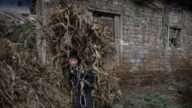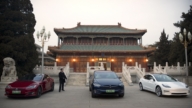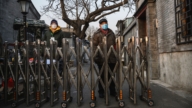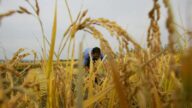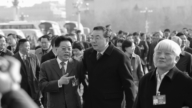【新唐人2013年06月25日讯】近来,大陆银行资金紧张,成为世界舆论关注焦点,中短期限资金利率纷纷创下历史新高,堪比高利贷,整个金融市场笼罩在一片紧张气氛中,不少分析家预测,中国将会爆发大规模经济危机。令外界猜测不已的是,这次中央银行没有如往年般的“出手相助”,而是选择了冷眼旁观。
6月以来,大陆金融系统陷入流动资金匮乏的危机,各大金融机构奔走互问还有钱吗?同时,各银行间同业拆借利率(shibor)飙升。而被银行界市场人士戏称为“央妈”的央行,却选择了按兵不动,市场议论纷纷。
香港《苹果日报》指出,温家宝主政时期,银行间市场资金如果出现短缺,央行通常会尽快投放资金,平抑利率, 2007年的金融危机之后,中共当局更是放出4万亿人民币的贷款。银行早已习惯于将央行作为资金的最后来源。但这次,“央妈”为何突然断奶,拒绝救市?
对此,金融专家分别从经济和政治两方面进行了解析。
中国金融分析师任中道:“如果央行再进行公开市场操作的话、往市场倒水的话,就会更加的推高房地产泡沫。所以央行没有什么操作。它就在等着,在进行试探,看市场最后的反应。它做一个赌博,如果不行的话,等到差不多7月份,它如果能挺得住就挺,挺不住就公开市场操作,所谓的降准、降息。”
《苹果日报》还引述英国《金融时报》日前发表的评论指出,大陆金融业的钱荒主要是因为“李克强经济学”发威造成。6月中,李克强甚至接连公开声明,不会再轻易发钱,要靠启动货币信贷存量来刺激经济。文章分析,李的强硬,正是为了逼迫各大银行从泡沫中主动脱身。那么,在他任期之初,先消除了经济中的危险因素,以免未来十年踩中地雷。
国务院发展研究中心的经济学家李佐军,早在2011年就预测到了﹕在2013年7、8月,中国大陆将发生经济危机。
李佐军说:“新一届政府领导将面临一个抉择,两种选择。一种选择是,把之前的经济泡沫再接过去,再精心维护,最迟能维护到2015年,或者2016年,但那个时候就是一个更大的危机。那个时候爆发的危机的责任在谁,谁也说不清楚。第二种选择,就是不接这个泡沫,上台之后很快让这个泡沫给破掉。破掉之后,首先会带来一段时间的痛苦,但对于新的领导人来说是好事,因为责任很清楚,不是他们造成的,是前面造成的。显然,李克强选择了第二种。”
另一方面,专家认为,中央和地方的矛盾,也是“央妈”变“后妈”的一个主要原因,而且早在政府换届前,双方的矛盾就已经逐渐显露。
任中道:“从政治角度来说,现在中共的地方政府和中央是为一种对抗状态。也就是所谓的诸侯割据,对抗上面的中共,李克强的方法也是敲山振虎,给那些不听话的小弟们给点颜色,你不听话吗?我不给你钱,没有钱,中共的地方政府也就完蛋了。”
据香港《争鸣》杂志报导,在去年底的中央经济工作会议上,28个省市地方政府要求中央一次性注销4万多亿已到期或者已拖欠的债务,并要求中央一次性调拨十年规划的资金,充实到各地政府管辖银行。当时即将卸任的前总理温家宝一口回绝说,地方债不能一笔勾销,欠债是要还的,并表示,没有权利调拨大量资金来填补地方银行的恶性坏账。
业内人士认为,虽然中央态度强硬,但如果银行真的发生系统性危机,中央也不会坐视不管,最糟糕的就是大量印刷货币,导致通货膨胀、货币贬值﹔或者,动用巨大外汇储备来填补所有的财政漏洞。
采访编辑/张天宇 后制/李月
No Help from China’s Central Bank Facing Capital Shortage
Banks in China have been experiencing a capital shortage,
which has become a global focus of interest.
Interest rates of short-term and mid-term funding
have hit record highs, comparable to usury.
The entire financial market has a tense atmosphere,
and many analysts predict that a large-scale
economic crisis will outbreak in China.
The People’s Bank of China (China’s central bank)
hasn’t “extended a helping hand” as it did in the past, but chooses to just stand by.
Since June China’s financial system has run into
a crisis of a lack of circulating capital,
with some major financial institutions asking
around for money.
Meanwhile, the interbank offered rate is soaring.
However, China’s central bank, often called the “Mother Bank,”
has chosen to do nothing, which has provoked much discussion.
Hong Kong’s Apple Daily said when Wen Jiabao was in power,
China’s central bank would quickly invest capital
to stabilize interest rates when there was a shortage of funds.
After the 2007 financial crisis, the Chinese Communist Party
(CCP) even invested a 4 trillion yuan ($650.7 billion) loan.
Banks are used to having the central bank as the ultimate source.
However, why doesn’t the “Mother Bank” bailout this time?
In this regard, financial experts analyze the situation from
both the economic and political perspectives.
China financial analyst, Ren Zhongdao: “If the central bank
conducted open market operations and poured money in,
it would push the real estate bubble even further.
So the central bank hasn’t done anything.
It’s waiting to see the final response of the market;
it’s making a gamble.
If thing’s don’t turn out well, it’ll wait until around July.
If it can hold on, it will;
otherwise it will take action to lower the interest rate.”
Apple Daily quoted the UK’s Financial Times as saying that
the “money shortage" in China is mainly because of the
“Li Keqiang Economics."
In mid-June Li Keqiang even make a public statement
that China will no longer invest money easily.
China will “launch a money and credit reserve”
to stimulate it’s economy.
The Apple Daily article says that Li makes a tough stance to
force major banks to proactively get away from the bubble,
thus eliminating the risk factors in the economy
at the start of his term.
Economist Li Zuojun at the Development Research
Center of the State Council said, as early as 2011,
he predicted China will have an economic crisis
around July and August of 2013.
Li Zuojun: “The new leadership faces two options:
One is to take over the economic bubble passed to them,
and meticulously maintain it until 2015 or 2016,
when there will be an even greater crisis,
and no one would be clear who is responsible for that.
The second option is to not take the bubble,
and have it burst once they take the office.
It will bring some pain for a while.
But to the new leaders, this is a good thing,
because it’s clear they aren’t responsible for it.
Obviously Li Keqiang chose the second option.”
Experts also believe the conflict between the
central and local governments is another reason
for “Mother Bank” to suddenly act as a “step-mother.”
The contradiction between the two sides has gradually
emerged as early as the power transition.
Ren Zhongdao: “From a political point of view,
China’s local government and central government
are in the state of conflict.
Li Keqiang is trying to warn the local officials,
giving the message: If you don’t listen, I won’t give you money,
and without money, local governments will be finished."
According to Hong Kong’s Chengming magazine, during the
“Central Economic Work Conference" held at the end of 2012,
28 provincial and city level local governments asked
the central government to put in over 4 trillion yuan to clear their default debts,
and allocate funds from the “10-Year Plan” to local banks.
The then premier Wen Jiabao refused the request.
He said local debt can’t be wiped out, “debt should be repaid,"
and expressed he has no right to allocate a large sum of money
to fill local banks’ vicious circle of bad debts.
Although the central government takes a tough stance,
industry experts say that if banks really have a systemic crisis,
the central government won’t sit idly by.
The worst result would be large scale money printing,
leading to inflation and currency devaluation,
or using huge foreign exchange reserves to fill financial holes.


